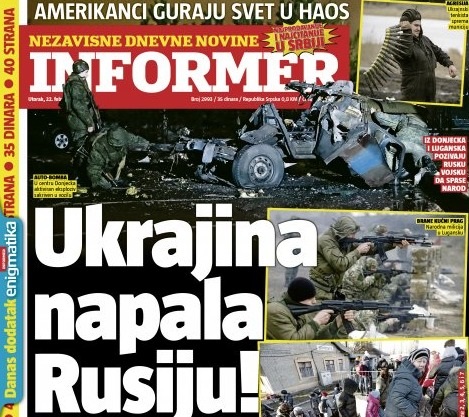Russian propaganda uses various forms of social media and channels to spread its propaganda. It is fighting a war in Ukraine, but also waging a hybrid war with many other countries. North Macedonia and the Balkans are the target of this propaganda, writes Truthmeter.mk.
Under the content-sharing agreement between Truthmeter.mk and Meta.mk, we republish the text below:
Author: Goran Lefkov
The social media are the strongest weapon of Russian propaganda. Lies, manipulations truth-twisting… that is the recipe of Putin’s regime “bombarding” the democratic world. From the very beginning of the war in Ukraine, the European Union banned the Russian channels that spread Russian propaganda like “Russia Today”, “Sputnik” and other TV channels and media outlets. And that was the moment Russian propaganda began to rise through communications on the social media.
Today, the main target of Russian propaganda is the social network Facebook, because unlike the traditional media, Facebook does not control such propaganda rigorously. Everything can be published, says Goran Georgiev, researcher at the Center for the Study of Democracy (CSD) from Sofia.
Another reason for using Facebook is because Russian propaganda is more efficient there, unlike traditional media that have other content and where Russian propagandists are not so sure whether the message will reach the intended users, Georgiev says.
CSD researches the activities of the Russian embassies in the Balkans, including the Russian mission in Skopje. Truthmeter already published an article on the social media activities of this embassy.
Russia and its allies do all that it takes to ensure that their views dominate in the social media.
Because of their activities, Meta – the owner of the social network Facebook – had to terminate Facebook’s Comment Moderation Agreement with the Canadian company Telus, which has clones in several Balkan countries.
A BBC investigation on the Persian-language moderation that took place in Essen, Germany, pointed out the fact that people in this company were compromised and trained by the Iranian Secret Service.
The same is true for our region. Bulgarians who worked in Telus moderated the content in both Bulgarian and Russian language on Facebook. They blocked profiles of people who criticized Russia, although the criticism did not violate Facebook’s terms of use. They deleted critical comments and let Russian disinformation spread.
Cyberspace responsive to propaganda
The decline of the traditional media, the financiаl crisis of the newspapers and television outlets led to a key turning point, especially through reaching young people. Although the television with approximately 75 percent is still the first medium of information in the country, important to note is that just over 50 percent of online-users also use the Internet for informing and reading news.
These trends were abused especially by totalitarian regimes, such as Russia and China, to expand their influence in the Balkan countries.
SCOOP Macedonia’s research pinpointed the fact that unlike 10 years ago, when Russian tycoons bought whole TV channels, as was the case with Alfa TV in Bulgaria by the leader of the party “Ataka” (Attack), Volen Sidеrov, now the trends movd online.
According to the research of the Institute for Global Analytics from Sofia, Russian influence is mostly disseminated through the Serbian portals “Sputnik” and “Informer”.
The capacity of Kremlin to penetrate information ecosystems in the countries of Southeast Europe depends on the extent of “local infrastructure” of sites and profiles supporting Kremlin policies, states the paper of the Institute for Global Analytics from Sofia, published last December.
Confirmation of this approach came from Hristo Grozev, one of the founders of the world-famous Bellingcat network of investigative journalists who lived in Vienna, but has now moved to a safe location with increased security due to the threat to his personal safety. This year he published the names of people in Bulgaria and Eastern Europe who were paid to spread Russian propaganda. The name of Darko Todorovski from Delchevo was specifically mentioned, but Todorovski stated that the analyzes were his own personal work as a PhD student in Russia.
Last June, Lena Borislavova, Cabinet Chief of the former Bulgarian Prime Minister Kiril Petkov, stated that the list of public figures, politicians, journalists and professors paid by the Russian services was long.
Cyberspace as a powerful disinformation tool
Social networks are playing a much bigger role in informing citizens. “Slightly above 50 percent of online users use the Internet for informing and reading news” claims MIM’s report. This share increases up to 85 percent among young people in the age range 15 to 29 years old.
But unlike traditional media, social networks are a very powerful tool in the hands of disinformers. Low media literacy of the citizens of North Macedonia secures fertile ground for such disinformation.
The danger of disinformation and fake news is great even for societies with much more developed democracy and media literacy. The example of the Veles-groups during the election of Donald Trump for President of the United States, as well as the Brexit case, showed that no one is safe nor immune to disinformation in the online space.
Several steps need to be undertaken to secure a better barrier from disinformation entering the online space.
According to Rumena Filipova, a researcher at the Institute for Global Analytics, the Southeast Europe region is a target of authoritarian regimes spreading disinformation.
Good quality journalistic stories that inform citizens about online dangers are necessary along with improved monitoring of media ownership and greater transparency of the origin of the capital of these owners, as well as the establishment of a strong regional network supporting investigative journalism and increasing media literacy, Filipova says.
Immediately after the aggression of Ukraine, regime structures in Moscow recruited the so-called “cyber soldiers” tasked to post comments on Telegram and YouTube justifying the aggression of Ukraine.
According to Andrey Zakharov, an investigative journalist from Russia, this model was already used for occupying the cyberspace.
Back in 2017, I discovered the so-called troll factories, while working at RBC. They were tasked to create disinformation aligned with Kremlin’s positions and to publish it as support to the non-democratic regimes in the world. This is how a great deal of lies and disinformation was fabricated during the US election and at the time of Brexit, Zakharov says.
This year RBC announced that the regime was recruiting so-called armies of cyber-soldiers.
Danger from Serbian sites for North Macedonia
In the latest research of the BIRODI Bureau for Social Research, Serbian portals “Sputnik” and “Informer” are the main weapon of Russian propaganda in the countries of former Yugoslavia. They are also supported by Russian energy companies operating in Serbia, through commercials and financing existing Serbian media.
Although these portals and media are published in Serbia, they are also transmitted online in North Macedonia.
Almost all Macedonians understand Serbian language. The contents of the pro-Russian portals in Serbia is easily accessible for the Macedonian readers. The older generations studied Serb-Croatian language at school, and men did military service in the Yugoslav People’s Army. All this makes Serbian propaganda portals a powerful tool for spreading Russian propaganda to the Macedonian population.

At the beginning of the year, “Truthmeter” wrote that North Macedonia was mentioned in “Sputnik” for topics that were aligned with positions of Russian propaganda.
In 2022, they were quite fluent, actively promoting Russian views. So, when one writes “North Macedonia” on “Informer”, more than 30 articles would appear just about the links between North Macedonia and Russia. The Macedonian government’s decision to expel 5 Russian diplomats in 2022 was used to promote the Russian side of the story. The statement given by Ivan Stoilkovic, a member of Macedonian Parliament from the Serbian community, that the expulsion of Russian diplomats from North Macedonia was just like expelling Serbs from Macedonia was also abused for fomenting the controversies.
Very often Stoiljkovic was present with statements and views in these portals. He and two other Members of Parliament from Levica (The Left) were the only ones in the Macedonian Parliament who voted against the adoption of the Declaration for Support of Ukraine.
In addition, the texts covered topics that stated that North Macedonia will face problems with energy and food supply. The same narratives could be found in Russian media, such as “Russia Today”.
Also present in the pro-Russian portals in Serbia were Russian officials threatening to ban the export of gas to North Macedonia and Montenegro, following the restriction of the flight of Sergey Lavrov over these countries.
Media influences of Turkey and China in North Macedonia
Turkey is traditionally present among the Muslims of the Balkans and spreads its influence through Turkish National Television Anadolu Agency, present in Kosovo, Bosnia and Herzegovina, North Macedonia and in parts of Albania. Acting as an intermediary between the warring parties, the Turkish position on the war in Ukraine is disseminated through these media.
Regarding Muslim propaganda, in addition to the Turkish organizations and channels on social networks, several non-governmental organizations and channels spreading propaganda of extreme Islam in North Macedonia can be identified, mostly among Muslim Albanians and Macedonians.
Chinese propaganda penetrated aggressively North Macedonia through investments in infrastructure projects, but also activities implemented through the Chinese University based in Budapest. In “Sunday Briefing” one can see that they have very similar views and approaches as the Russian propaganda.
Even though this propaganda is new, it still started quite aggressively. A more direct channel for Chinese information campaigns is Facebook. Namely, the pages of the Chinese Embassy in Skopje and the Confucius Institute have been present on Facebook almost since its establishment in 2013 although with fewer posts in the beginning compared to today.
Innovative forms of spreading malignant influence
The latest thing performed by the Russian embassies on Facebook is a technique known as black propaganda. This is a psychological warfare technique.
These are posts coordinated by the Russian secret services. How does it work? They publish a screenshot of a website known to us as a portal that publishes Russian disinformation. In the text of that screenshot, they will post content such as the following:
This website was created by the West. They say it belongs to the Russian services, but that is not the case. This makes Russian authorities look like the bad guys, says Georgiev.
Frequent source of disinformation in North Macedonia can be the same Twitter profile of the Russian Ambassador in Skopje, Sergey Bazdnikin. This directly indicates that the official Russian administration is involved in the disinformation war.
All available methods and models are used – from posts on social networks, to organization of events promoting the “Russian truth”. These tendencies are reiterated in almost every country.
In Bulgaria they organized events and even abused children for their propaganda. The most recent example was in Varna, (where the support for Vuzrazhdane – the largest pro-Russian party in Bulgari). Namely, an event was organized where the Russian Ambassador Eleonora Mitrofanova was supposed to give a speech. Students were told that their absence from school would be treated as unexcused. The plan was to share this event on social networks, and Mitrofanova’s speech was supposed to contain Russian propaganda.
One of the latest research on this topic is that of Metamorphosis conducted in the period from November 2021 to April 2022. The conclusion derived is that disinformation began to spread rapidly as soon as the war broke out in Ukraine, on 24th February 2022. In the same token, “the largest number of disinformation articles originated from social networks – as many as 152 of the analyzed stock were personal posts from Facebook and only eight were media articles.” In addition, disinformation was mostly based on media articles in national or foreign media (as many as 76 of all disinformation articles), followed by posts on social networks (38 posts out of which 19 on “Facebook” and 14 on “Twitter”). To a lesser extent, disinformation was also based on YouTube posts (16), websites (13), as well as other sources.




















![Young people in a three-day-workshop learned about data visualization [Gallery]](https://meta.mk/wp-content/uploads/2023/12/obuka-za-vizuelizacija-na-podatoci-vo-dekemvri-2023--100x70.jpg)




